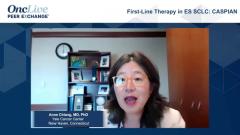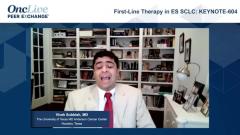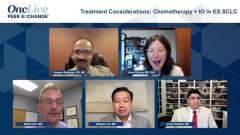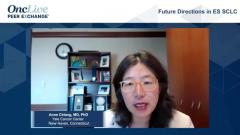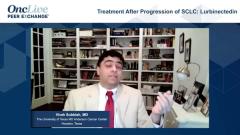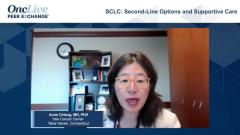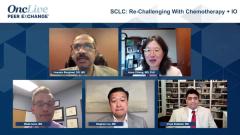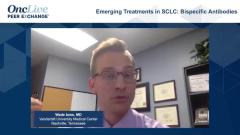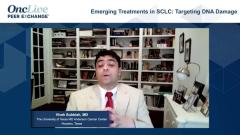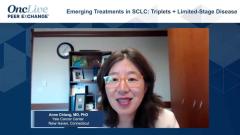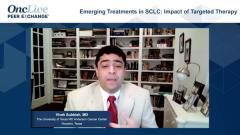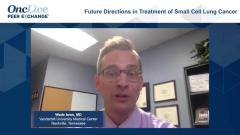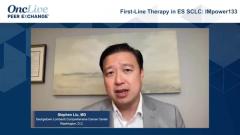
First-Line Therapy in ES SCLC: IMpower133
Stephen Liu, MD guides a discussion on recent updates on IO+chemotherapy combinations in extensive-stage small cell lung cancer by reviewing data from the phase 3 IMpower133 l trial of carboplatin/etoposide/atezolizumab.
Episodes in this series

Hossein Borghaei, DO, MS: Hello, and welcome to this OncLive® Peer Exchange® titled “Evolving Approaches in Small Cell Lung Cancer.” I’m Hossein Borghaei, a thoracic medical oncologist at Fox Chase Cancer Center [in Philadelphia, Pennsylvania]. Joining me in this discussion are my colleagues, all of whom are experts in the field of lung cancer and in clinical research: Dr Anne Chiang, Dr Wade Iams, Dr Stephen Liu, and Dr Vivek Subbiah. We’re going to discuss a number of topics pertaining to the use of systemic therapy in patients with small cell lung cancer. We’ll discuss the latest research in the field and the impact of recent clinical trials on making decisions around these treatment decisions.
This program is going to have 3 separate sections. Let’s get started on our first topic: the role of first-line therapy for patients with extensive-stage small cell lung cancer. We decided ahead of time to go based on our first names, so I’m going to start with Stephen. Can you bring us up to date regarding IMpower133 and some more recent studies that use real-world data to talk about the 2 randomized phase 3 studies with patients with extensive-stage small cell lung cancer?
Stephen Liu, MD: Sure, I’m happy to. Thanks for the question. IMpower133 was the first major change to frontline treatment for extensive-stage small cell lung cancer in 30 or 40 years. Prior to that, going back to the 1980s and ’90s, it was chemotherapy alone with platinum-etoposide that offered reliably high response rates. But it also offered reliably high relapse rates, fairly short progression-free survival, and short overall survival. IMpower133 showed that adding the PD-L1 inhibitor atezolizumab concurrently with chemotherapy and as maintenance treatment to carboplatin-etoposide chemotherapy improved both progression-free survival and overall survival without adding notable toxicity.
This trial has a fairly straightforward design. Approximately 400 patients with previously untreated extensive-stage small cell lung cancer were randomized 1:1 to receive atezolizumab or placebo, given with 4 cycles of carboplatin-etoposide followed by maintenance therapy until progression or loss of benefit. We’ve recently updated these data. With longer follow-up, we see that benefit persists. We have a median overall survival of about 12.3 months with atezolizumab compared with 10.3 months in the standard arm. That has a hazard ratio of 0.76 and a 24% reduction of the risk of death. We saw an improvement in the 1-year survival rate of about 13%, from 39% to 52%. Interestingly, that was the exact same improvement at the 18-month survival rate. It’s reassuring to see that benefit persist with a little more follow-up. There’s a slight benefit in progression-free survival as well.
When we look at these curves, we see that they separate. It’s not the degree of benefit we are all waiting for, but it’s clearly an improvement over chemotherapy alone. We are trying to identify the patients who derive that benefit. The past few years, we’ve looked at various biomarkers, including tumor mutational burden and PD-L1 expression with various assays. It’s simply not useful in identifying patients who derive the benefit from atezolizumab. We see that benefit across the board.
More recently, we discussed the role of transcription subsets based on the expression of certain transcription regulators. Work led by doctors Charlie Rudin, Triparna Sen, and Lauren Byers was based on the expression of lineage-defining factors like ASCL1, NEUROD1, POU2F3, and the more recent inflamed subtype. Some subgroups, like the inflamed subgroups, seem to be enriched for atezolizumab benefit, but they simply aren’t useful in identifying who should and shouldn’t receive immunotherapy. Biomarker work is still ongoing.
At the 2021 ASCO [American Society of Clinical Oncology] Annual Meeting, Dr Eric Nadler looked at some really weird outcomes in the US Oncology networks. IMpower133 was FDA approved in March 2019. The data were first presented in September 2018. This abstract looked at patients diagnosed with extensive-stage small cell between October 2018 and December 2019, with follow-up well into 2020. Of the 347 patients, 77% received atezolizumab, showing a very broad uptake of the regimen in practice. Of note, 55% of those patients were diagnosed as an inpatient, and 20% of patients received cycle 1 as an inpatient, which reflects most of our practices.
As you can imagine, this population was different from a clinical trial population. It was much older and more diverse, with more brain metastases—23% compared with 8% in the studies—and a worse ECOG Performance Status [PS], with 1 of 4 patients having a PS of 2 or greater. But the outcomes were similar. They were almost identical in terms of time on treatment, duration of therapy, continued therapy, and in marked survival. The real-world data based on this abstract matches up very closely to what we see in IMpower133, despite the population generally having worse prognostic factors.
Hossein Borghaei, DO, MS: Thank you, Stephen. You’re raising several important issues. I’m hoping we can come back to that when we have a general discussion. I love that real-world data because, as you pointed out, it’s a completely different patient population from what we get in clinical trials. We all realize that in the real world, that’s what we have. They’re very interesting data. It’s also very comforting and good to see that the results seem to match what we got in the clinical trial in terms of the clinical efficacy.
TRANSCRIPT EDITED FOR CLARITY


